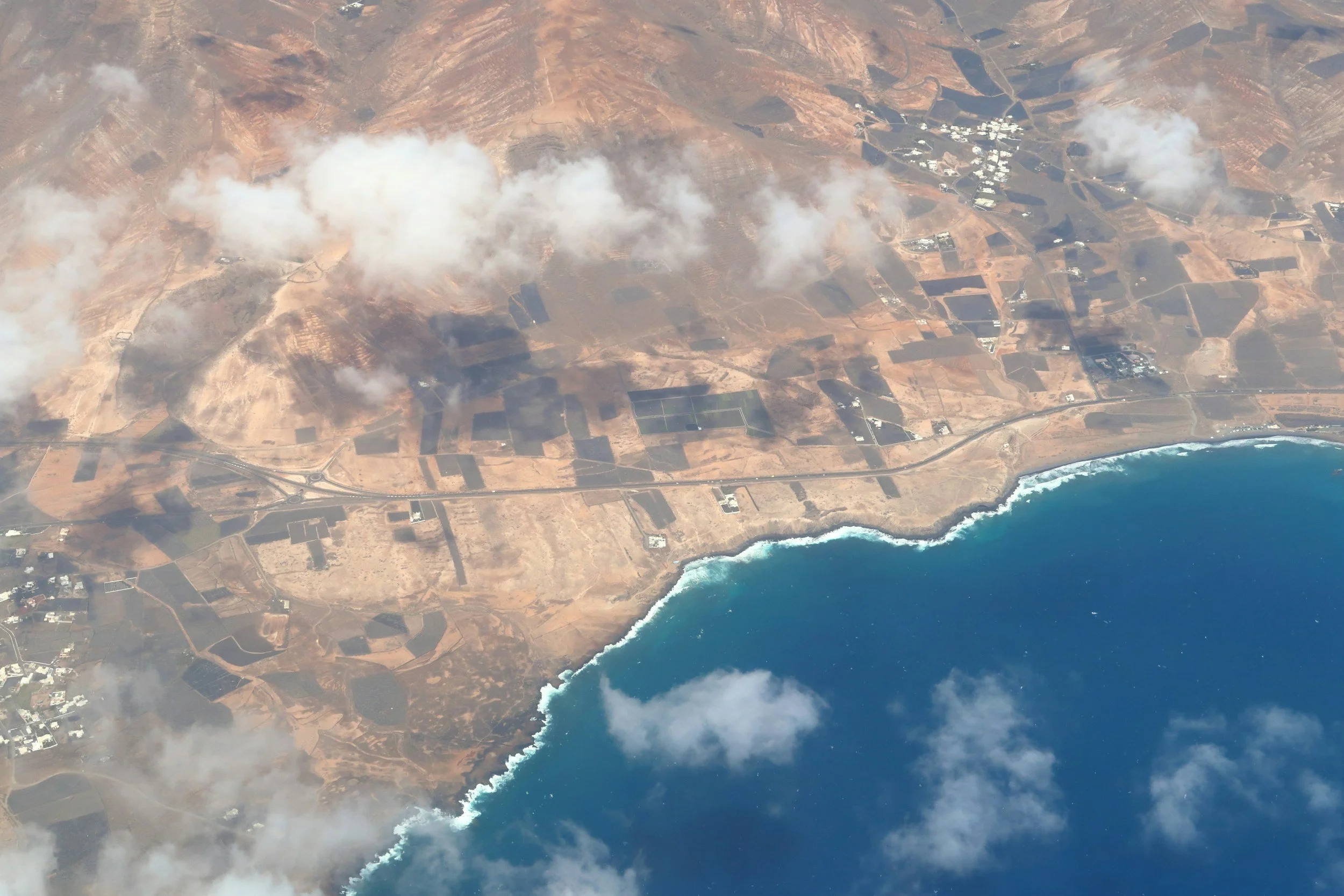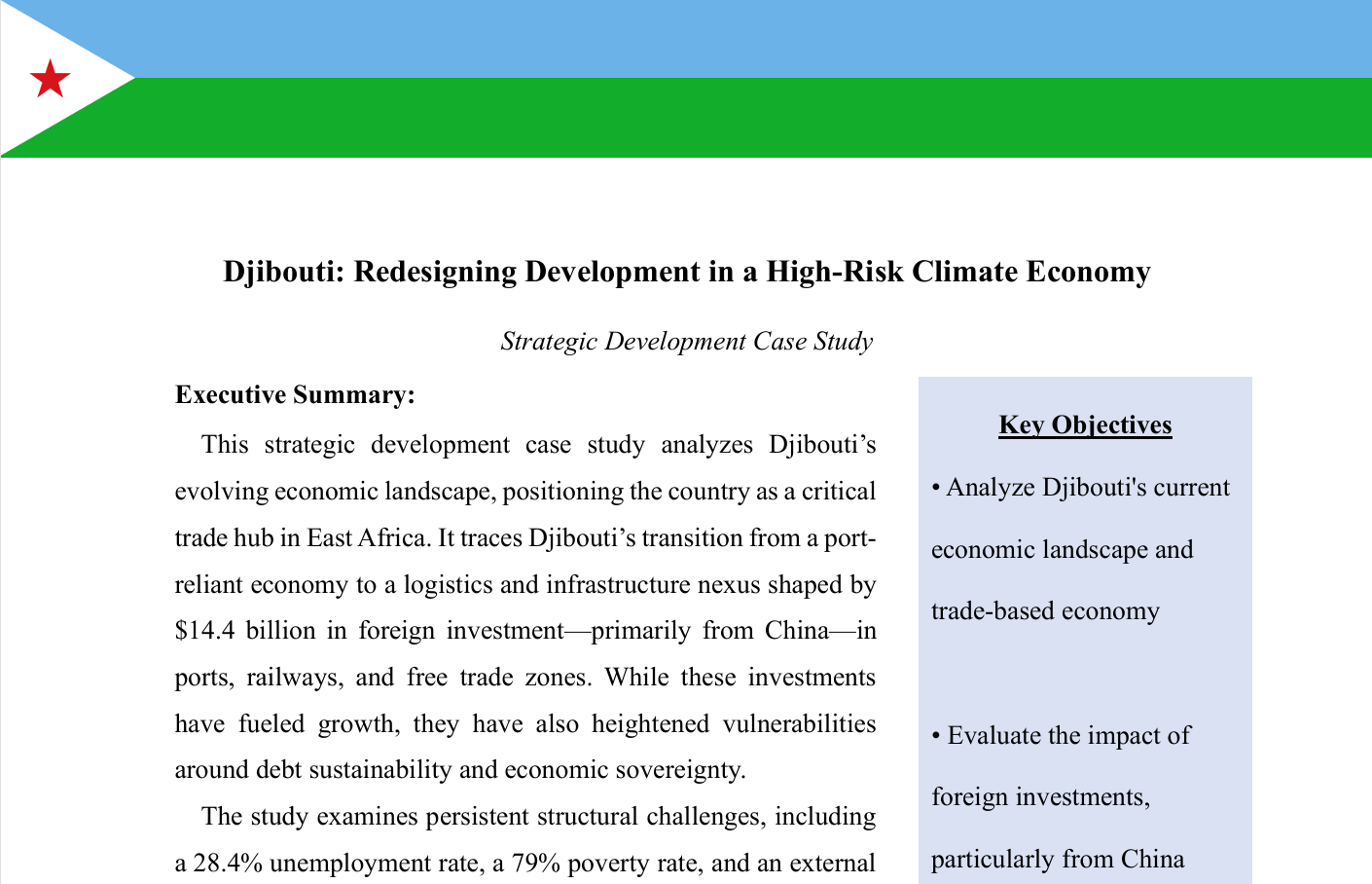
Djibouti: Redesigning Development in a High-Risk Climate Economy
December 2024
Project Type: Country Economic Analysis & Sustainable Development Strategy
Focus Areas: Foreign Investment, Debt Sustainability, Climate Adaptation, Economic Diversification
Case Study: Djibouti Strategic Development Case Study - Manreet Sohi.pdf
Overview
This case study presents a forward-looking development strategy for Djibouti, a high-potential trade hub in East Africa facing severe economic vulnerabilities. The project evaluates the country's dependency on port-centered logistics and Chinese-funded infrastructure while addressing the risks of debt distress and economic fragility.
The analysis identifies climate-resilient diversification pathways, specifically the expansion of geothermal energy, marine tourism, and sustainable agriculture, to reduce unemployment and external dependence. Policy recommendations include targeted vertical FDI initiatives and reform-oriented aid strategies aimed at balancing foreign investment with long-term domestic capacity building.
🚨 Key Challenges
Widespread poverty and unemployment: 79% of the population lives in poverty, with an unemployment rate of 28.4%, and over 79.9% youth unemployment, highlighting a lack of domestic industry and inclusive growth.
Unsustainable external debt: Djibouti holds $2.68B in external debt, with 70% owed to China, raising serious concerns about debt servicing, sovereignty, and long-term financial autonomy.
Economic overdependence on trade corridors: The economy relies almost entirely on port services and re-exports, with Ethiopia as a primary client, making Djibouti highly exposed to geopolitical tensions and regional instability.
Limited climate resilience: Just 4% of land is arable, and water scarcity is severe. Djibouti imports over 90% of its food and fuel, making it vulnerable to global supply chain shocks and climate-driven resource volatility.
Weak institutional capacity: High levels of corruption (CPI score of 30) and limited transparency in aid and investment management hinder development outcomes and long-term planning.
💡 Proposed Solutions
Scale geothermal energy as an export industry: Leverage Djibouti’s untapped geothermal reserves by attracting investment through targeted subsidies and trade zone incentives.
Develop a sustainable marine ecotourism sector: Shift focus from underperforming fisheries to high-value marine tourism by marketing Djibouti’s coral reefs and marine biodiversity.
Pursue vertical FDI in logistics and light manufacturing: Capitalize on Djibouti’s strategic trade location by inviting FDI that builds domestic capacity in port-adjacent industries (e.g. packaging, transport, warehousing)
Reform foreign aid utilization with accountability measures: Implement regular progress reviews modeled after Rwanda’s aid management frameworks to prevent misuse and improve outcomes.
Invest in climate-resilient agriculture through pilot programs: Collaborate with regional experts (e.g. ICARDA) to introduce dryland farming techniques and hydroponics. Begin with localized pilot projects targeting food security in extreme-poverty communities, eventually scaling to reduce dependence on food imports.
Anticipated Impact : By diversifying Djibouti’s economic base beyond port services, this strategy reduces vulnerability to external trade shocks and fosters long-term resilience. Investments in geothermal energy and marine ecotourism are expected to create scalable employment, especially for low- and semi-skilled workers, while positioning renewable energy as a clean export alternative that attracts foreign capital. Targeted agricultural pilots will improve food security and reduce import dependence, enhancing domestic welfare. Together, these interventions build the foundation for sustainable growth, decreased debt reliance, and stronger climate adaptability.
End Result: Delivered a strategic roadmap for economic diversification in Djibouti, outlining actionable solutions to reduce reliance on trade, scale renewable energy and ecotourism sectors, and address critical issues of unemployment, external debt, and widespread poverty.
